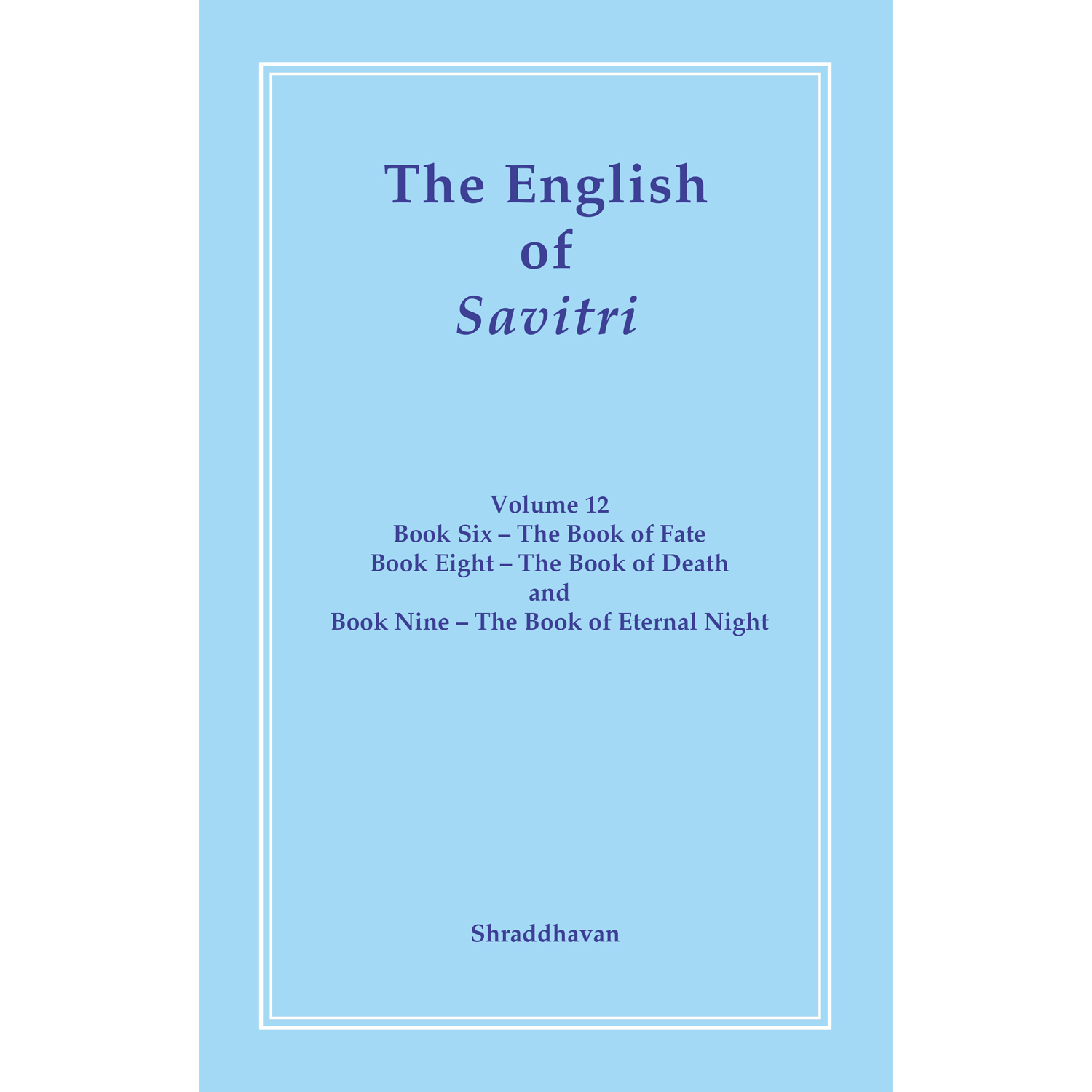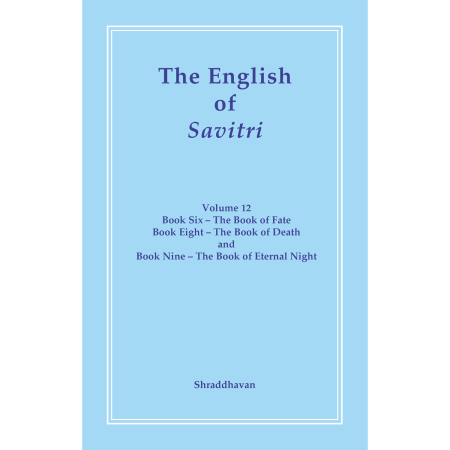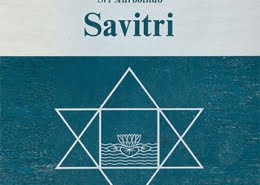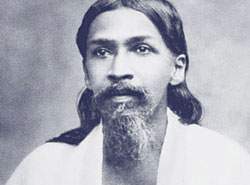The English of Savitri (Volume 12)

The English of Savitri
volume 12
Author: Shraddhavan
Print Length: 420 pages
Publisher: Savitri Bhavan
Book format: PDF, ePub, Kindle
Language: English
Book Download
Table of Contents
Book Six – The Book of Fate
- Canto One. The Word of Fate
- Section 1 : lines 1-106
- Section 2 : lines 107-201
- Section 3 : lines 202-757
- Canto Two. The Way of Fate and the Problem of Pain
- Section 1 : lines 1-189
- Section 2 : lines 190-399
- Section 3 : lines 400-516
- Section 4 : lines 517-619
- Section 5 : lines 620-688
- Section 6 : lines 689-825
- Section 7 : lines 826-897
- Section 8 : lines 898-909
Summary of Book Seven – The Book of Yoga
Book Eight – The Book of Death
- Canto Three. Death in the Forest
- Book Nine – The Book of Eternal Night
- Canto One. Towards the Black Void
- Section 1 : lines 1-83
- Section 2 : lines 84-220
- Section 3 : lines 221-372
- Canto Two. The Journey in Eternal Night and the Voice of the Darkness
Book Sample
The English of Savitri
volume 12
This is the Twelfth and final volume of the English of Savitri series, which attempts to explain in simple language Sri Aurobindo’s epic poem Savitri – A Legend and a Symbol. This volume contains the explanation of Book Six, The Book of Fate; Book Eight, The Book of Death; and Book Nine, The Book of Eternal Night.
The previous volume, Volume 11, covered Book Four, The Book of Birth and Quest, and Book Five, The Book of Love. There we were following the story of Savitri, right from her birth and childhood to her quest, her journey in search of her destined life partner. In the three cantos of Book Five, Sri Aurobindo beautifully described for us her journey far and wide, covering all kinds of terrain; how she meets Satyavan, a prince by birth but now living in a hermitage in the forest; how they recognise each other at first sight, that they have been together in many previous lives; Savitri accepting Satyavan as her life partner by putting a garland of wild flowers around his neck; and Satyavan showing her his hut in the forest which is to be her future home. Book Five ended with Savitri telling Satyavan “… ‘I must haste back to my father’s house’,” obviously to seek her parents’ blessings for their marriage. She promises to Satyavan that “‘soon I shall return’,” and speeds away ‘swift-reined, swift-hearted’, carrying the image of Satyavan as ‘her heart’s constant scene’.
Book Six is one of the most important Books in Savitri. It begins with the description of Sage Narad visiting the palace of King Aswapati, and singing to the King and Queen ‘of the lotus-heart of love’. Into this scene enters Savitri and breaks the news that “‘One whom I sought I found in distant lands … The son of Dyumatsena, Satyavan’.” Her parents approve her choice and request Narad to ‘Confirm this blithe conjunction of two stars / And sanction joy with thy celestial voice’.” Narad hesitates, but when pressed further by the queen he reveals his foreknowledge: Only ‘Twelve swift-winged months are given to him and her; / This day returning Satyavan must die’. The devastated queen advises her daughter to ‘travel once more through the peopled lands’ and ‘Choose once again’. But Savitri replies in a calm voice: “‘Once my heart chose and chooses not again’.” When her efforts fail to convince Savitri to choose again, the queen mother confronts Narad, ‘Voicing earth’s questions’. What follows is a very poignant dialogue between the two: Savitri’s mother and the sage, which reveals to all of us human beings some basic truths about human life and the role of Fate. She asks: Why do human beings have to suffer grief and pain? Is it God, our creator, making us suffer like this? What is Fate? Is everything happening just by chance or by necessity? Is there a way out? Narad patiently answers all her questions going into the minutest details. Nowhere in literature would we find such a revelatory explanation of the Way of Fate and the Problem of Pain, as Sri Aurobindo calls it. Also it is worth remembering that Sri Aurobindo added in his poem this Book of Fate, the content of which does not find a mention in the original legend in the Mahabharatha, specifically to share with us readers some of the insights that he had acquired through his yoga of a lifetime, about some of the basic issues that human beings confront, such as grief and pain and suffering, all that we call by the name ‘fate’. Through these passages we also get a glimpse of what he himself had to undergo in the process of fulfilling his mission. Book Six ends with Narad returning to his heavenly abode, but before that advises Savitri’s parents: ‘Intrude not twixt her spirit and its force / But leave her to her mighty self and Fate’.
In the next Book, Book Seven, The Book of Yoga, Savitri’s life in the forest with Satyavan for one full year is covered: how she suffers alone the foreknowledge of Satyavan’s death, which she cannot share with anyone else, and how she prepares herself to face the eventuality through the practice of a powerful yoga. In this very important Book Sri Aurobindo reveals again his own spiritual experiences to us in a step-by-step manner. We have already covered Book Seven in Volume 3 of this series, and only a summary of it is included in this volume for the sake of continuity.
Finally in Book Eight, The Book of Death, as prophesied by Narad, at the end of one year of their married life, Death comes and takes away Satyavan’s soul. Thus ends Part Two of the poem.
Part Three opens with Book Nine, The Book of Eternal Night, which describes how Savitri follows her husband Satyavan into the territory of Death. The Book tells us in detail how she has to suffer the darkest Eternal Night, which is against all existence and wants to swallow her up for adventuring into its realm. But Savitri survives that terrifying experience, and by the end of Book Nine she can see some hope and light; with that this final volume of this series is concluded.




